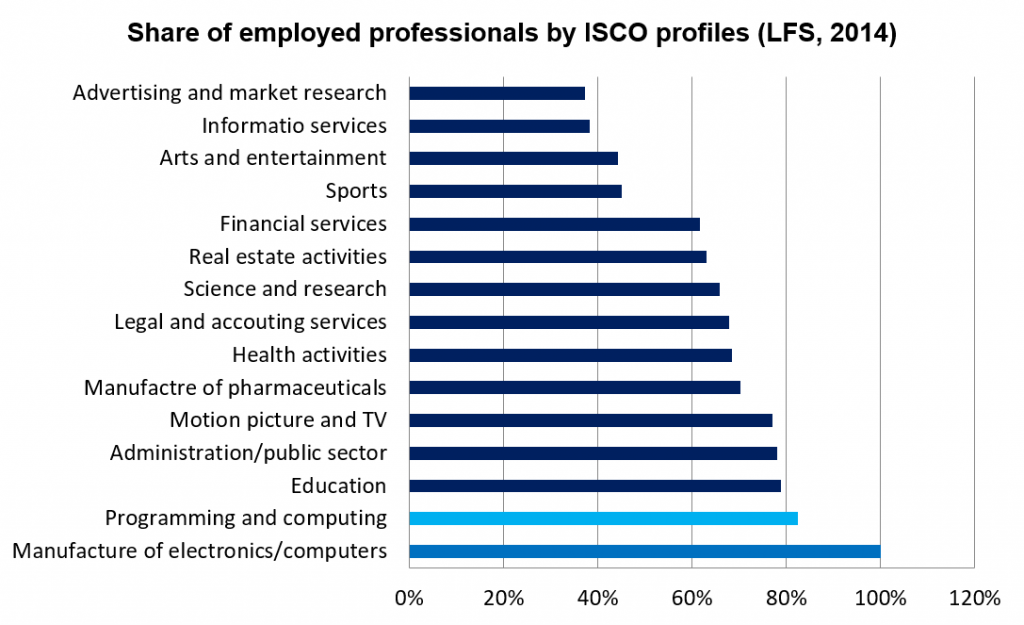INTERACTION BETWEEN INDUSTRY AND PARTNERSHIPS
The graduates at UBT are expected to be able to adapt quickly to the trends in industry, to respond quickly to the needs of the market and to adopt an integrative approach in product and process development, and by virtue of their knowledge and experience in various disciplinary skills, be more competent team leaders. The graduates will be required to work in an industrial environment deploying advanced technology according to CSE principles as well as communicate with and provide a link between a specialist in particular area with the requirements of Kosovans businesses. They will also be able to make significant contributions in all stages information systems development – from conceptualisation to final product design in a truly systemic approach wherein information technology and management sub systems are simultaneously integrated to provide solutions to real problems in industry and the society.
The Kosovo labour market demand for information technology has been particularly high in recent years. Based on a recent study of higher education graduate demand in economic and skill sectors (EC/LSE, 2015) in Western Balkans and Kosovo, ICT technicians and professionals is one of the most dynamic occupations in employment growth in Kosovo. UBT on the other hand uses an indicator framework to assess demand for professionals and economic sectors. The indicator framework is composed of: (1) skill sectors employing most of professionals (to differentiative among all workers in the sector), (2) share of professionals’ distribution in all economic sectors (ISCO) and (3) job creation tendency in the past decade for the respective economic sector (NACE).
According to Kosovo Labour Force Survey (2015), the economic sectors with the highest share of employed professionals is in computer programming and manufacture of computers and electronics.
Adjusting to changing demands is usually rooted in knowledge used for creating the products and services being marketed. If the know-how is imported and the competitive advantage is built on cheap labour, there may be positive effects on income, employment and overall social welfare.Therefore, domestic knowledge growth and development are key to gain and retain competitiveness. A proxy used for the ability of economic sectors to adjust, innovate and remain competitive is the share of the employed in jobs which require high level skills in information systems and management attainable dominantly through higher education qualifications as well as technical skills for applying knowledge in production environments.
Based on the job creation indicator, despite its recent application and introduction to Kosovo economy, the ICT sector has created about 6500 new jobs.
In summary, on the basis of Labour Force Survey computer programming and manufacture of computers and electronics are some of skill areas employing the highest share of professionals. Secondly, the professional occupations related to ICT find are applicable in about 30% of Kosovo economy mainly in industrial production, public administration, ICT, healthcare and personal services. The ICT sector has created around 6500 jobs in the past decade and according to economic projections another 10,000 new jobs will be created until 2025 (USAID, 2014). A more recent study on ICT labour market demand (STIKK, 2016) by the Kosovo Association of Information Technology indicates a rising number of demand for business application development. Nearly 60% of demands for ICT professionals relate to application development, database design and software.
The development of the master program has been initiated on the basis of both supply and demand imperatives. Firstly, the institution in line with National Economic Strategy, National Education Strategy, National Research and ICT Strategy as well as the institutional strategic plan sees the program as a step to contributing to social and economic development of the community where it operates. Overall, Kosovo is lagging behind in terms of integration, development and commercialization of information system services.
The Governments’ strategic education plan foresees investments in ICT sector in general as step towards improving processes and efficiency of various public and private sectors in Kosovo including attempts to implement e-Governance Strategy, E-Justice plan, information systems to assist law enforcement and disaster risk management, establishment of information systems in education sector to improve quality of learning and life-long learning, attempts to adopt an e-Health strategy for clinical support and setting up enterprise information systems to help the private sector develop.
On the other hand, the institution has worked with a number of public service institutions (Kosovo Clinical Center e.g) and local governments and has seen the need of contemporary information systems in improving health records, primary family care, social service delivery at local level. Additionally, the local government would generally need an development and integration of information systems in area of land management, environmental disaster management, primary and secondary healthcare, primary and secondary education provision, agriculture and rural development etc. On the demand side, the institution sees a growing trend of integration and the need for qualified labour and services for businesses and ICT industry. The internal sector surveys done by UBT Stats point to the emerging need and demand from various industrial sectors for more sophisticated decision and production support systems. Kosovo’s integration into the world economy has brought with it competitive forces that are pushing local businesses towards the need for constant innovation. Firms rated competences in computer science and information systems as the primary inputs that they would need in the coming year.
Finally, the institution houses a growing body of students that complete their undergraduate studies in computer sciences, information systems, engineering, and business and management. The last Student survey indicated a strong demand from the existing students for a consecutive path-way for further study. Additionally, the staff members working at the undergraduate level have shown great commitment and desire to see further offers in the area of information systems. Generally speaking, UBT is viewed as the most credible private provider of higher education that has the capacities and international partnerships to deliver on the programs of this domain
The target group of this program may already have some hands on experience however the program is also designed to give further experience for both target groups. The ‘writing up’ or reporting of practical work is therefore very important. Students are frequently guided to critique their work and propose improvements on the approaches they took and the results they achieved. UBT has many agreements with various institutions and companies (IPKO, ASEKO, Ministries, Raifaissen Bank etc) and has proven to be a success story..

